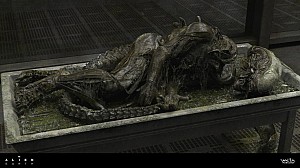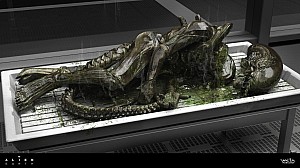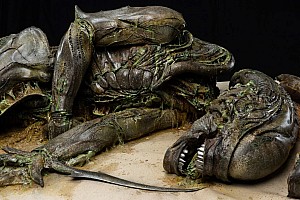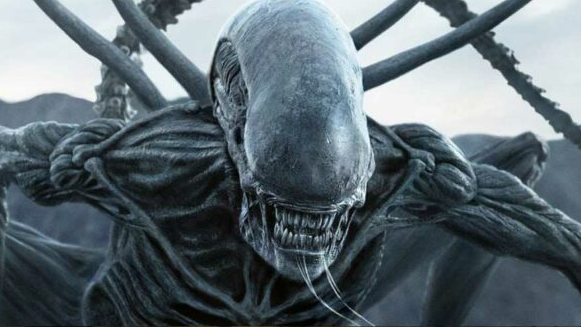Zarathustra's Space Oddyssey
Prometheus Forum Topic
PhilipKidd
MemberOvomorphOct 16, 20121629 Views2 RepliesI wanted to email this to a movie review online magazine thing but it's not good enough so here it is for you guys to read and rip apart :)
Zarathustra's Space Oddyssey
'Thus Spoke Zarathustra' is referenced in much of the Prometheus promotional material within and outside of the film itself, it is a philosophical work of poetry and the theme song in 2001: A Space Oddyssey. Neitzchean themes are fairly evident in Prometheus if you know Neitzche and know what to look for, but that is not our focus,we will perceive and interpret the film through Neitzche rather than hunting for evidence of his work.
The connection to Kubricks 2001: A Space Oddysey can be quite revealing. If we think of Alien as Scott's 2001 and then of the sequel, 2010: The Year We Make Contact we see what Scott might have felt as he was developing his prequel. Whilst 2010 was a technically acceptable film, its explanations of events in 2001 were its pitfall. While both Alien and 2001 have an heir of mystery and other-worldliness, 2010 demonstrated that some things are just better left unexplained. With Prometheus, Scott has tried very hard to avoid over-explanation of the original mythos, perhaps to the films detriment. I use 'perhaps' because of the major subjective elements at play regarding audience, such are actually substantial themes in the film, as discussed here. This explains a lot of the issues fans have found with the character inconsistencies such as David's vague motives, Holloway's on screen frustration and Vickers awkward death. Conceivably this could explain the film as basically a massive troll on the fan-base, but then only the 'wrong' type of fans as Huls suggests. We can allude this partly to fanboyism and it's effect on 2001 as well as especially Star Wars. In relation to fan-rage Scott has both avoided over-explanation, which is validated by 2010s criticisms. Whilst also deliberately exploring outwards from the original idea, as the major issue fans had with the Star Wars prequels was their unrelenting reliance on Darth Vader's origin story. This is a very delicate balancing act for Scott and one which tended to polarize audiences and that kind of turned into the goal.
The easiest way to explain this development is chronologically: Scott would certainly have encountered such problems of balance in creating the narrative and did certainly recognize the polarizing effect of his involvement in any addition to the franchise, particularly a prequel involving the engineers would have early on the development. He may even have watched the Star Wars Plinkett reviews late into the drafting stages and come to a conclusion: Instead of avoiding polarization as an issue, make it the issue.
So Ridley created the Prometheus story and then hired Damon Lindelof possibly to work in elements of ancient alien conspiracy but more likely just as a name to throw people (namely hardcore fans) off. In an age where conspiracy theories grow on trees and more people believe in aliens than god, Lindelofs name struck a cord in the paranoid Alien fan-base: they saw Lost and Prometheus, put two and two together and expectations for them sky-rocketed.
Faith
The films ultimate theme is faith. This is evident on the surface with the Christmas tree scene, Shaw's cross etc. but also in the subtext between the Prometheus plot and Alien plot. Scott seeks with this divided plot to polarize the audience, isolating zealous Alien fans from adaptable 'good' fans. His methods however could have damaged the film for the entirely new-comer audience. But if we see faith and fandom as the absolute and predominant then it makes more sense. The 'wrong' fans are the Alien zealots: those with a blind faith in the franchise rather than it's creator Scott, who appropriately according to Huls personifies himself in opening scene as the creator and the one true god. The debate as to whether Scott or Giger is really responsible for the success of alien fits in well with the Nietzschean thematic questions in Prometheus such as 'who made us?'; Does our maker love us?'; and now even 'how are we to trust those who claim to have made us?' etc.
Conspiracies: The Truth is Nonesense
However when we think post-Neitzche, in terms of atheist faith we get an interesting mix. Let's jump in and take 9/11. The theories over 9/11 didn't gain much of a following until a few years ex post facto. Probably because the world needed to digest the actions taken by the US state in response. The conspiracies probably wouldn't have gained a following if there simply was no state response. But why are they so strong now? This has been debated elsewhere... nearly everywhere in fact so, briefly: If there is no god, then why do these things happen? Why do such massive events occur? Surely only a handful of men couldn't have attacked the great and powerful United States of America? No, of course not. So it must have either been aliens, the Illuminati or the US state because y'know, we're so powerful and in control that only we have the power to harm ourselves. These are the thought processes of a paranoid atheist. This is where the residual faith left in the shot where we killed god is placed, conspiracies of universal powers. Neitzche foresaw this. Well he could have if he lowered his expectations of humanity just a touch. This is what Prometheus plays on, that element of faith combined with Scotts marketing talents I created mass hysteria among conspiracy theorists, cinema goers, Alien fans, paranoid atheists and curious agnostics. This is exactly how Space Jesus got involved. Scott, with the help of Lindelof, drip fed the audience with just enough evidence to concoct a sustainable space jesus theory from Prometheus. The funniest and best part of this is that the theories don't even cite the original Alien: this is entirely on Prometheus' own merit.
So at this point the audience is completely polarized between those who searched out the Alien references and were disappointed with the distinct lack of any reference to LV-426 notwithstanding the Deacon; and those who payed too much attention to the exposition of detail regarding the engineer mythos which by this point is seriously unlikely to result in Space Jesus especially in Paradise and especially after the Blue-Ray commentary which let us know that the writers had that in mind. On the judgmental note regarding Blue-Rays and DVD extras. The film is not 'broken' when it 'requires' explanation via DVD commentary. It is the audience and particularly the fan-base that are 'broken' when they demand of the film-maker an explanation of every turn of events with a severe lack of appreciation for the 'no-reason'. For a lovely rant on this see the opening scene from Rubber. Did the audience leaving the theaters after Alien bicker about the necessity of a prequel? Yeah... possibly.
In Closing, Ridley Scott: A Jealous God
This is important both in understanding and appreciating Prometheus but also for the inevitable Paradise. Aspects of feminism and sexuality dominated Alien, however this was not initially intended. It has been confirmed that a Fox executive created Ripley by asking that the script be altered have a female lead. Without this alteration as well as the major contributions of Giger, much of the sexual themes would have been lost and the film probably would have flopped. We must remember that Giger wasn't actually involved in Prometheus and virtually the whole premise of the movie spawns from his art eg. The Engineer in the chair, Derelict, Xenomorph, Dome etc.
Acknowledging this we recognize that Scott didn't initiate those sexual themes, they were inherent in the script but Giger's artwork really brought them out to shine. Now in Prometheus there are minor elements of sex but they are barely recognizable in the cinematic release. The plot directing sex between Holloway and Shaw and the consequences of which turn out to be a red-herring, part of the fanboy troll as mentioned early, it works purely to distract the 'bad' audience from the main story until finally rewarding them with a minor easter-egg Alien reference: The Deacon. This distraction creates problems for narrative-direction and sequencing because a lot of the innocent 'good' audience can get lost especially if they haven't seen Alien and don't have that expectation of 'sexual happenings means xenomorphs are coming'. There's even a deleted scene 'Janek fills Vickers in' that is a blatant reference to the sexual tensions of the Alien franchise, we can only be thankful that it was removed as it would only have acted to distract the audience further from the Prometheus plot.
Many Alien fans who recognized the feminist themes in the first film also recognized the eroding of such themes in the sequels. For instance Camerons severe alterations to Ripley's character as well as multiple themes in Alien did not go undetected. Such as the inclusion of: Ripley's dock-worker back story which fit neatly into the end battle with the Queen; Ripley's daughter; The egg-laying queen; Newt; Militarization; Reaganist hard bodies such as PrivateVasquez; Hive-minded xenomorphs. There is thus a strong argument that Cameron met with such success with Aliens for completely different reasons than those of Scott with Alien. Whereas Scott created an original technophobic space-aged haunted house, Cameron pandered to 1980s audiences of hard bodies, guns and reaganist values, this pandering is an undeniable method of Cameron. Thus Prometheus should remain separate from Aliens at least.
As for Fincher's contribution it's debatable. He kept some aspects of the sexual tension but focused strictly on developing Ripley in very different direction from Camerons take, unsuccessfully trying to fix her. The religious themes in both Prometheus and Alien 3 are very distinguishable though: Prometheus has faith whereas Alien 3 has redemption. However audiences were confronted with two major problems that unfortunately can only be identified in retrospect: 1) Fincher could never have successfully directed an Alien sequel not set on earth and 2) the writers either needed to drop Ripley or the xenomorphs for the narrative they wanted to succeed, which would have been completed rejected by Aliens fans.
Resurrection can be better understood by its critics if it's viewed in terms of fanboyism and parody. Riddled with references to its predecessors as well as experimental visual styles and ideas, Resurrection is more of a tribute to the franchise than a de facto contribution. It seems to be commonly accepted that resurrection was aborted from the mythos where Prometheus was concerned. The one idea Resurrection loosely shares with Prometheus is the human aspiration to become the 'super-human', though again this is only a loose connection. One vague reference I feel it necessary to mention is in relation to The Cabin In The Woods [Spoiler] where Sigourney plays 'The Director' who directs horrific scenarios in order to it would seem, appease the Lovecraftian elder gods of horror movies. Think of this in connection to Scott's interpretation of his role in the Alien Franchise as exhibited in the opening scene of Prometheus: Is Scott using stereotypical plot mechanics and disposable characters to appease the gods or is he just a cruel god?
P.S.
I absolutely loved Prometheus and Alien but in very different lights. I've loved keeping up with the conspiracies etc. leading up to the cinematic release, particularly Time Travelling Space Jesus and I loved the film itself, it was beautiful, mysterious, terrifying and surprising. Ridley takes care of his baby!
Links:
[url]http://www.filmschoolrejects.com/opinions/dear-audience-prometheus-is-about-you-ahuls.php[/url]
[url]http://redlettermedia.com/plinkett/star-wars/star-wars-episode-iii-revenge-of-the-sith/[/url]
[url]http://cavalorn.livejournal.com/584135.html[/url]
[url]http://www.youtube.com/watch?v=fTFbXLbv71Y[/url]
[url]http://redlettermedia.com/plinkett/other-movies/avatar/[/url]
[url]http://www.youtube.com/watch?v=u94wR0NfewE[/url]
[i]*link fix by Feebs*[/i]
Are you an avid Alien fan looking for a dedicated online community of likeminded fans? Look no further! Create your own profile today and take part in our forums and gain XP points for all the content you post!










